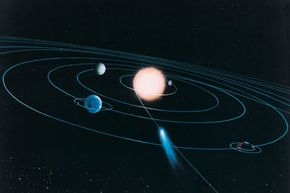Math: Human Discovery or Human Invention?
So just what, in essence, is this thing called math? In developing these numbers and systems of numbers, did we discover the hidden coding of the universe? Is mathematics, in the words of Galileo, the language of God? Or is math just a human-created system that happens to correspond with natural laws and structures? There is no definitive answer to this question, but mathematicians tend to side with one of several compelling theories.
First, there is the Platonic theory. Greek philosopher Plato argued that math is a discoverable system that underlines the structure of the universe. In other words, the universe is made of math and the more we understand this vast interplay of numbers, the more we can understand nature itself. To put it more bluntly, mathematics exists independent of humans -- that it was here before we evolved and will continue on long after we're extinct.
Advertisement
The opposing argument, therefore, is that math is a man-made tool -- an abstraction free of time and space that merely corresponds with the universe. Just consider elliptical planetary orbits. While such an elliptical trajectory provides astronomers with a close approximation of the planet's movement, it's not a perfect one [source: Dehaene].
Several theories expand on this idea.
- The logistic theory, for instance, holds that math is an extension of human reasoning and logic.
- The intuitionist theory defines math as a system of purely mental constructs that are internally consistent.
- The formalist theory argues that mathematics boils down to the manipulation of man-made symbols. In other words, these theories propose that math is a kind of analogy that draws a line between concepts and real events.
- The fictionalist theory, while less popular, even goes so far as to equate mathematics with fairy tales: scientifically useful fictions. In other words, 1 + 1 = 2 might enable us to understand how the universe works, but it isn't a "true" statement.
Who's right? Who's wrong? There's ultimately no way to know, but on the next page we'll look at two examples of what each possibility could mean to our understanding of the universe.
